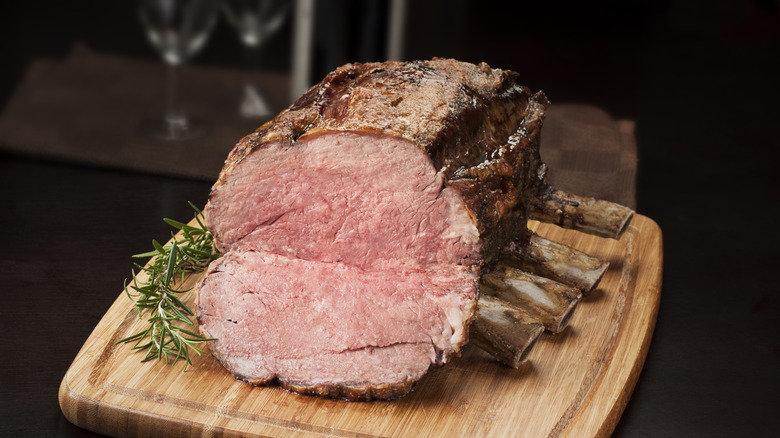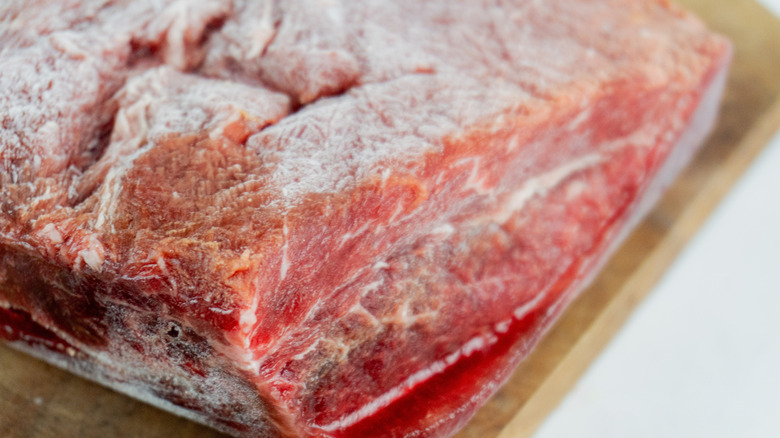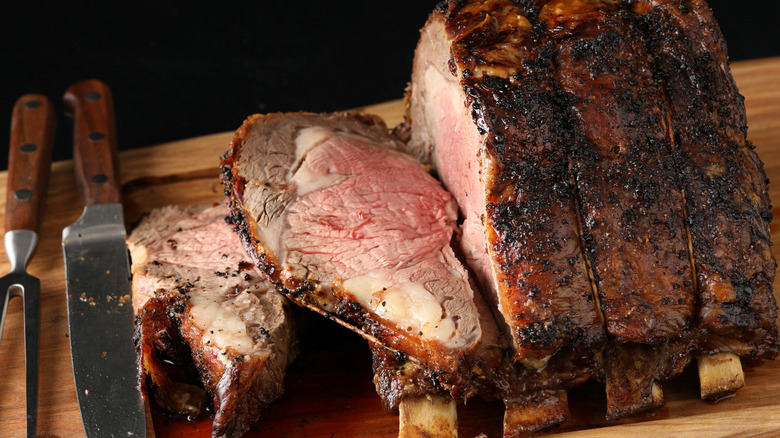Is Frozen Prime Rib Really Just As Good As Fresh?
If you were to whisper the words "prime rib" within a 5-mile radius of a steak lover's hearing, almost all of us would come running. Yes, prime rib garners that kind of reaction from us (even if I'm being a bit hyperbolic). Why? Because when done right, it doesn't get much better than prime rib. Now, down to business... you're here for the deets on frozen prime rib and whether or not it can stand up to its fresh counterpart. In the fewest words possible — yes! But not without a caveat or two.
A certain amount of skepticism is definitely warranted here, but believe me when I say that frozen prime rib can deliver nearly the same flavor and tenderness as fresh prime rib — so long as it's properly frozen and thawed. Obviously, we're not talking about just chucking it in the freezer haphazardly, without any concern for that precious cut of meat. We're talking about using modern freezing techniques to preserve the meat's quality while at the same time locking in its moisture and flavor. It all depends on how the meat is treated before and after freezing it.
Fresh prime rib has the advantage of never having to undergo the freezing process, so freezer burn and texture changes aren't even a thing here. But, if you're working with a high-quality cut and follow proper thawing techniques, frozen prime rib can definitely rival fresh prime rib in both taste and texture. (Either way, you'll need to know how to cut it right.)
Freezing prime rib isn't all bad
It's not the worst thing in the world to freeze your prime rib if you don't want it to go to waste. For starters, freezing puts a stop to bacterial growth and locks in the natural juices of the meat. Flash freezing is even better because it rapidly cools the meat; preserving the cellular structure and guaranteeing that the texture remains intact after thawing.
There are some potential pitfalls that you have to be on the lookout for, though. If prime rib isn't wrapped properly or frozen at the right temperature, it can develop freezer burn — a condition where dehydration will most certainly alter the surface texture and flavor of the beef. To work around this, wrap your prime rib tightly in plastic wrap, or better yet vacuum-seal it before freezing it. Using an airtight container can also help maintain its quality over time.
When it's time to thaw your prime rib, slow and steady wins the race. Thaw your frozen prime rib in the refrigerator for 24 to 48 hours to ensure even defrosting. Avoid shortcuts like microwaving, which can partially cook the meat and affect its texture. By respecting the freezing and thawing process, you can get results that aren't far off from fresh. Think of it like "Harry Potter" versus "Lord of the Rings." Is the latter better than the former? Unequivocally, no. But... it's a close second. That's where we're at with this.
When to choose fresh versus frozen
Fresh prime rib shines when you're looking for peak flavor and texture with minimal effort. Since it hasn't undergone freezing, the meat retains its original juiciness and tenderness. If you're buying from a trusted butcher or planning a same-day roast, fresh is the way to go.
Frozen prime rib, however, is ideal for meal planning and convenience. It's perfect for those who want to take advantage of a sale or stock up for future occasions. High-quality frozen cuts, especially those flash-frozen, can taste nearly as good as fresh when properly handled. The convenience of having a prime rib ready to thaw and cook makes frozen an excellent backup plan for last-minute gatherings.
In the end, the choice between fresh and frozen depends on your priorities. If you're aiming for the ultimate dining experience and time isn't a factor, fresh is hard to beat. But if practicality and preparation are your focus, frozen prime rib is a worthy contender that delivers flavor and quality. Just make sure to reheat any leftover prime rib the right way or all the effort will go to waste.


